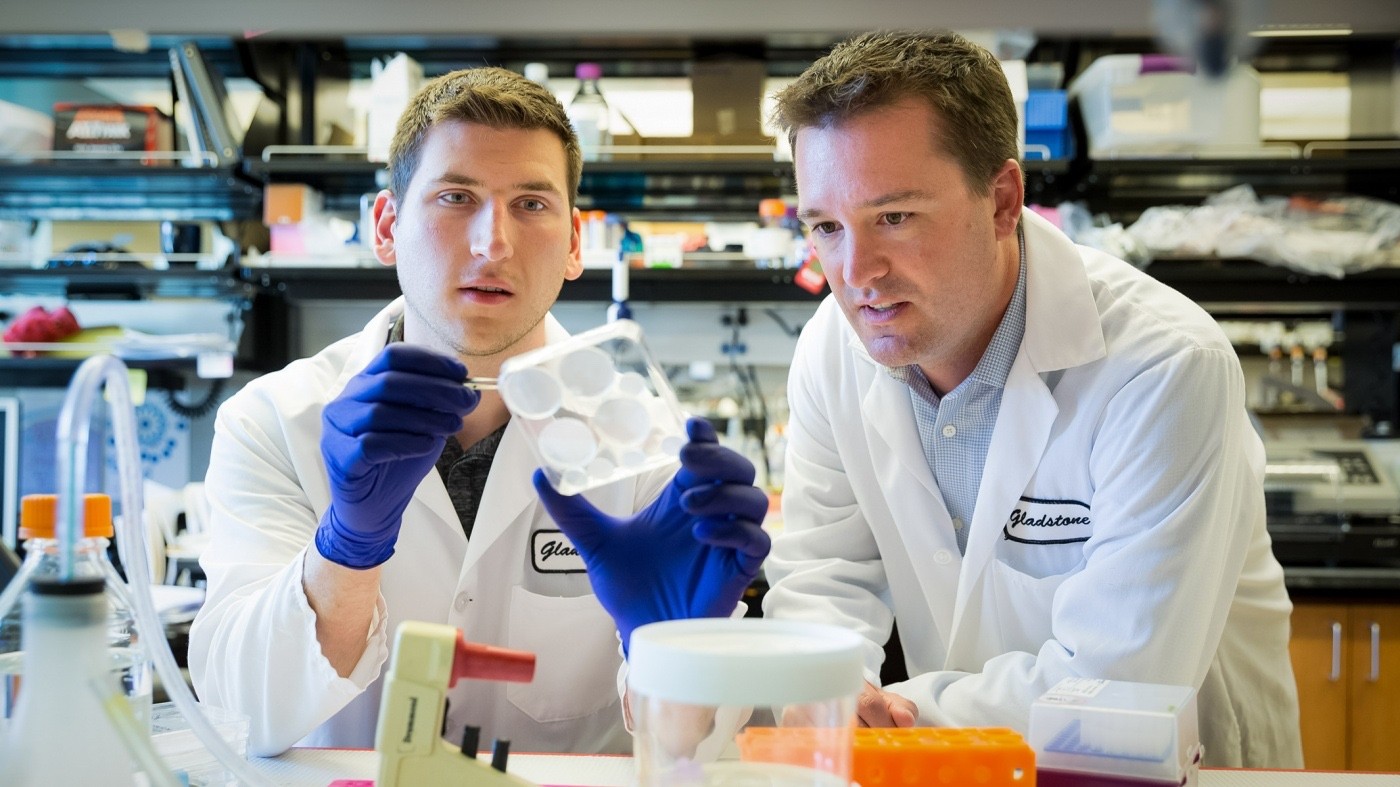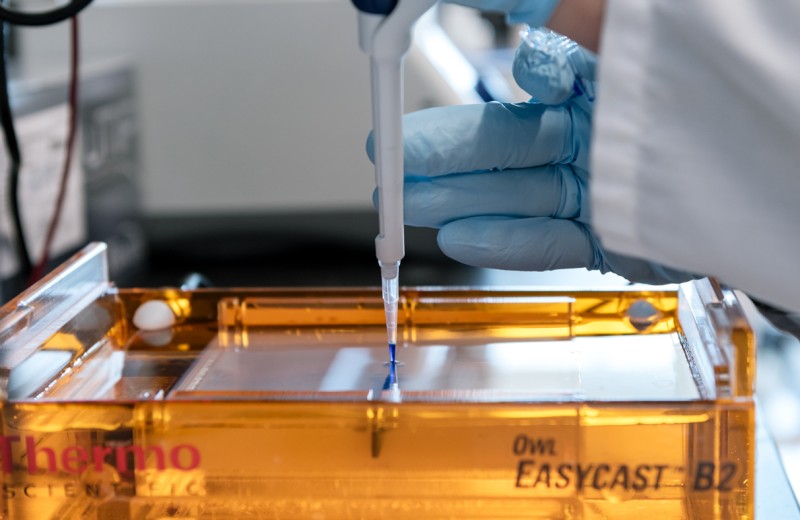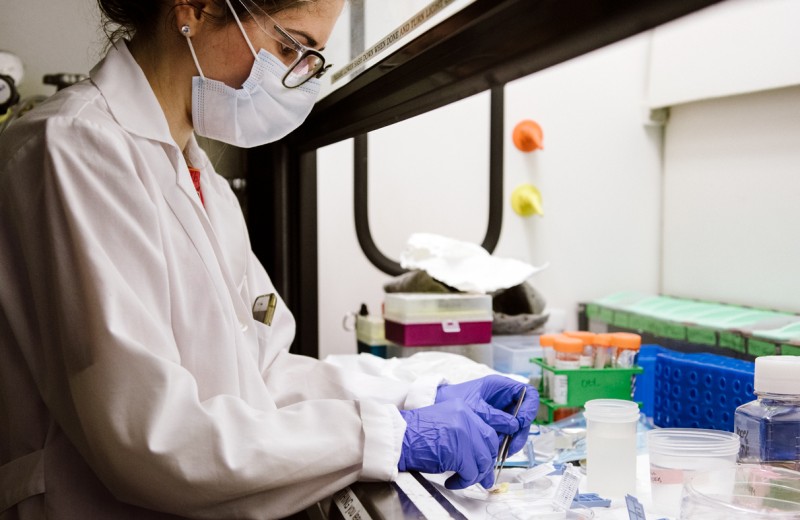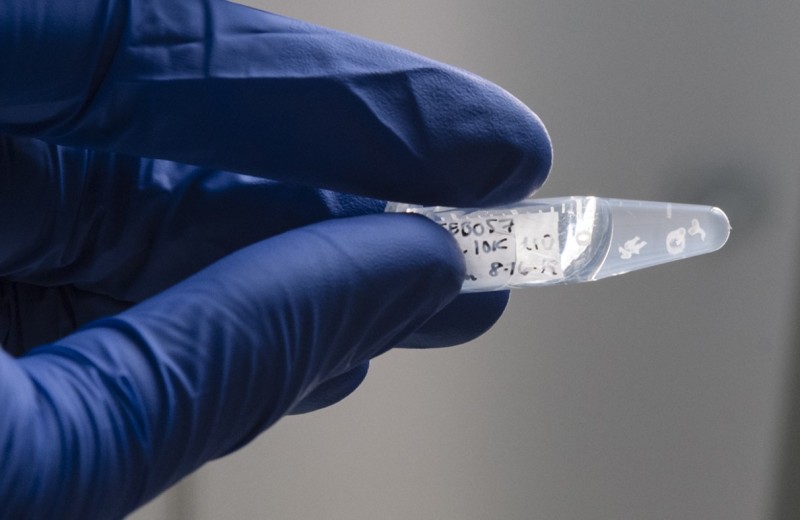Gladstone NOW: The Campaign Join Us on the Journey✕

Josh Zimmermann, PhD, (left) and Todd McDevitt, PhD, discovered a biomaterials hack that can boost cells’ ability to combat inflammation and potentially treat autoimmune diseases. [Photo: Elisabeth Fall]
With a trick of engineering, scientists at the Gladstone Institutes improved a potential weapon against inflammation and autoimmune disorders. Their work could one day benefit patients who suffer from inflammatory bowel disease or organ transplant rejection.
The Body’s Natural Defense
Mesenchymal stromal cells (MSCs) reside in bone marrow and have been found to secrete anti-inflammatory proteins that help regulate the immune system. More than 500 clinical trials are trying to use these cells to fight diseases, but so far, many have failed.
Scientists think this failure may be because, like a match needs to be sparked to create a flame, MSCs must be triggered by pro-inflammatory proteins to produce their immune-suppressing effects. Some studies have tried soaking MSCs in a bath of pro-inflammatory chemicals before injecting the cells into a patient. However, the effects are short-lived, wearing off after just a few days.
“The success of therapies involving MSCs depends on the cells’ environment,” explained Todd McDevitt, PhD, a senior investigator at Gladstone. “A patient taking anti-inflammatory medication may not have high enough levels of inflammation to trigger the cells. We engineered the MSCs to ensure that they are consistently activated, so they can reliably dampen the immune response for longer.”
Engineering A Better Method
In the new study, published in Stem Cells Translational Medicine, the scientists engineered tiny sugar-based particles that they loaded with pro-inflammatory proteins and stuck into the middle of clusters of MSCs. The particles slowly delivered the inflammatory trigger to the cells in a steady dose. This method increased the amount of anti-inflammatory proteins produced by the MSCs, enhancing the suppression of immune cells. In short, the cell-protein packets worked better and longer than other treatments.
“No one has successfully used biomaterials to deliver pro-inflammatory signals to control how MSCs affect the immune system,” said first author Josh Zimmermann, PhD, a former graduate student in the McDevitt lab. “Our research suggests bioengineering has real potential to improve the anti-inflammatory and therapeutic abilities of MSCs. The next step is to test this method in a mouse model of autoimmune disease.”
Want to Join the Team?
Our people are our most important asset. We offer a wide array of career opportunities both in our administrative offices and in our labs.
Explore CareersMini-Livers on a Chip
Mini-Livers on a Chip
A new platform designed by Gladstone scientists for studying how the immune system responds to hepatitis C virus could speed the hunt for a vaccine
News Release Research (Publication) Hepatitis C Infectious Disease McDevitt Lab Ott Lab OrganoidsIt Takes Guts to Make a Heart
It Takes Guts to Make a Heart
Gladstone scientists create novel organoids that open new doors for understanding crosstalk between tissues during human development
News Release Research (Publication) Cardiovascular Disease McDevitt Lab OrganoidsHow Do Developing Spinal Cords Choose “Heads” or “Tails”?
How Do Developing Spinal Cords Choose “Heads” or “Tails”?
A new human organoid developed by Gladstone scientists mimics one of the key steps in early embryonic development
News Release Research (Publication) Cardiovascular Disease McDevitt Lab CRISPR/Gene Editing Stem Cells/iPSCs



